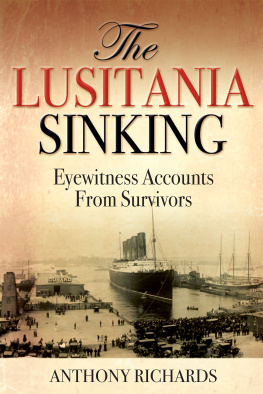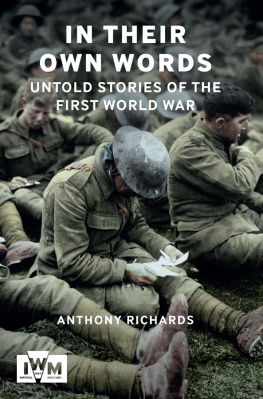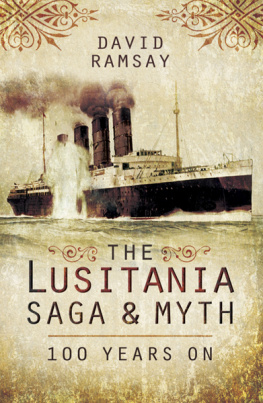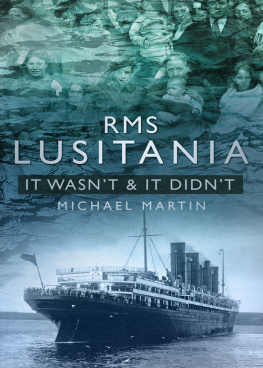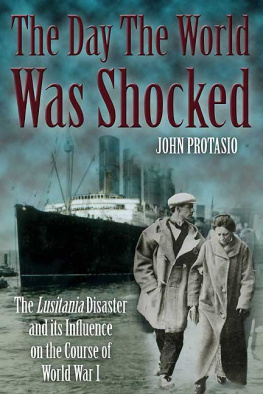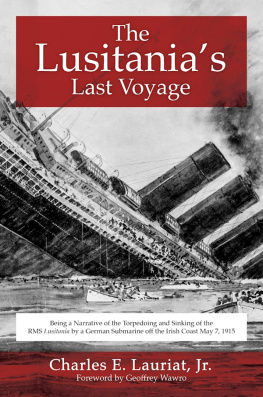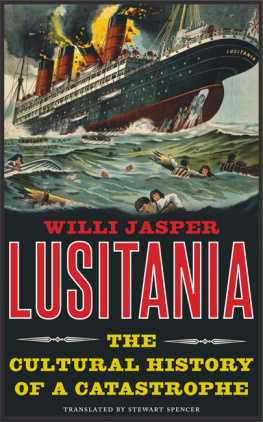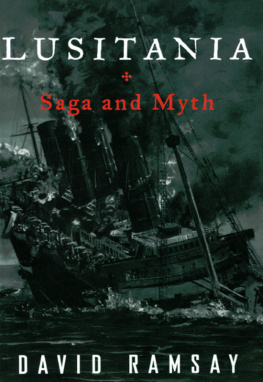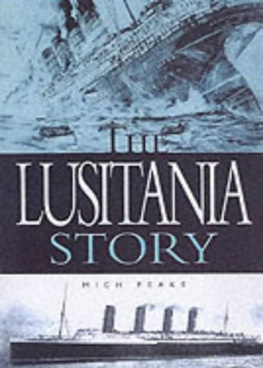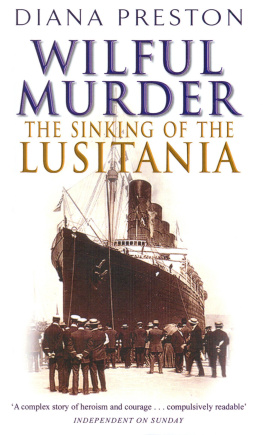The Lusitania Sinking
All rights reserved.
Anthony Richards, 2019
The right of Anthony Richards to be identified as author of this work has been asserted in accordance with Section 77 of the Copyrights Designs and Patents Act 1988.
_______________________________
First published in 2019 by Greenhill Books,
c/o Pen & Sword Books Ltd,
47 Church Street, Barnsley,
S. Yorkshire, S70 2AS
ISBN: 9781784383015
CIP data records for this title are available from the British Library.
Designed and typeset by Donald Sommerville
Printed and bound in the UK by TJ International Ltd, Padstow
Typeset in 11.8 pt Arno Pro Small Text and 12.5 pt Arno Pro Display
_______________________________
Published in North America in 2019 by
Dundurn
3 Church Street, Suite 500
Toronto, Ontario, Canada
M5E 1M2
All rights reserved. No part of this publication may be reproduced, stored in a retrieval system, or transmitted in any form or by any means, electronic, mechanical, photocopying, recording, or otherwise (except for brief passages for purpose of review) without the prior permission of Dundurn Press. Permission to photocopy should be requested from Access Copyright.
ISBN (North America): 978-1-4597-4348-9 (hardcover)
ISBN (North America): 978-1-4597-4349-6 (pdf)
ISBN (North America): 978-1-4597-4350-2 (epub)
CIP data records for this title are available from Library and Archives Canada.
We acknowledge the support of the Canada Council for the Arts, which last year invested $153 million to bring the arts to Canadians throughout the country, and the Ontario Arts Council for our publishing program. We also acknowledge the financial support of the Government of Ontario, through the Ontario Book Publishing Tax Credit and Ontario Creates, and the Government of Canada.
Nous remercions le Conseil des arts du Canada de son soutien. Lan dernier, le Conseil a investi 153 millions de dollars pour mettre de lart dans la vie des Canadiennes et des Canadiens de tout le pays.
Care has been taken to trace the ownership of copyright material used in this book.
The author and the publisher welcome any information enabling them to rectify any references or credits in subsequent editions. J. Kirk Howard, President
The publisher is not responsible for websites or their content unless they are owned by the publisher.
Contents
List of Illustrations
Frontispiece: A Canadian recruitment poster capitalising on the propaganda value of the Lusitania sinking. (Library of Congress)
Plates
Introduction
Why another book on the Lusitania sinking?
Since the event itself, many hundreds of books and articles have been written about Lusitania and her tragic fate on 7 May 1915, ranging from journalistic investigations into the reasons behind her sinking, to dramatic works with an emphasis upon the social life of her elite passengers. These have varied not only in intent but also in style: maritime histories concentrating on the engineering of the mighty ship compete with photograph-based books, while military histories tend to place the sinking more strongly within its First World War context.
Having looked at so many impressive but disparate works, it struck me that there was still room in the Lusitania bibliography for something which might add a more personal element to the familiar story. Brief quotations from the same passengers and crew reappear throughout many books, and as the testimony of survivors is the foundation upon which we now rely to tell the story of what happened, their importance is unquestionable. Yet I was often left wondering what exactly they recalled, in their own words, rather than just the odd short quote or how a particular author may have paraphrased or interpreted them.
This book therefore chooses to concentrate wherever possible on the words of those who experienced the event themselves and, by doing so, tells the story of the ship and her passengers in the most immediate way possible: through the words of those who were actually there. The archive sources used in this book include both contemporary written accounts and oral history interviews conducted many years later.
Key to my approach was to choose one person to follow throughout the narrative of the ship an everyman if you like whose fate would be entwined with that of Lusitania. In December 2000 almost 200 letters appeared for auction at Sothebys in London, concerning the fate of Preston Prichard after embarking on the doomed voyage. At that time I was successful in purchasing the correspondence on behalf of the Imperial War Museum and nuggets of information from the letters have subsequently appeared in various books. Prestons story, however, always deserved to be told in full and this book therefore includes, for the first time in print, virtually all of the letters in their proper historical context. With the full support of the surviving Prichard family, I am delighted to be able to feature him as the key running thread throughout this book. In many ways, this is as much Prestons story as that of Lusitania.
Over a hundred years after the sinking, there are no longer any survivors to explain what it was like to live through such a tragedy, and it is all too easy to forget that these were real people whose lives were often irreversibly changed by the trauma they experienced. By analysing the fate of one particular passenger in tandem with the common experience, and looking in particular at the legacy which the sinking subsequently left to his family and friends, I hope that readers will find the story a more immediate and affecting one.
Prologue
Preston Prichard
December 1905 saw the nineteen-year-old Richard Preston Prichard embark from Liverpool on a voyage to Halifax, Nova Scotia. He was accompanied by the bare minimum of luggage, although his case contained a gun given to him by his Uncle Charlie: appropriate protection for one intending to settle in the untamed New World. With dark brown hair, blue eyes and a dimpled chin, Preston was a good-looking and popular young man determined to seek his fortune. He braved a stormy Atlantic passage in the steamer Parisian, on what would prove to be one of the most significant voyages of his life, if not the most fateful.
Following the untimely death of his stockbroker father at the age of forty-nine earlier that year, responsibility for supporting his family had fallen to Preston as the elder son. For the Prichards including his mother Margaret, his brother Mostyn and two sisters, Gwladys and Gwen their beloved Prets would now be the chief breadwinner.
Had a dreadful voyage and was taken ill on the Friday after we left Ireland and was in bed until the following Sunday. On Thursday a full gale and on Friday half the one, all the rigging was frozen hard and ice was all over everything. We had to keep the machinery going the whole time in order to keep things right. Its awful to be so seasick. I have such a sore throat I could not eat, only bread and milk, Bovril and porridge for the whole journey. My lips peeled and my tongue was parched and what with being rocked this way and that and the other it was chronic. The steward said no one had ever seen worse and he has made 42 voyages. On the voyage we had all the boats uncovered in readiness during the gale.

